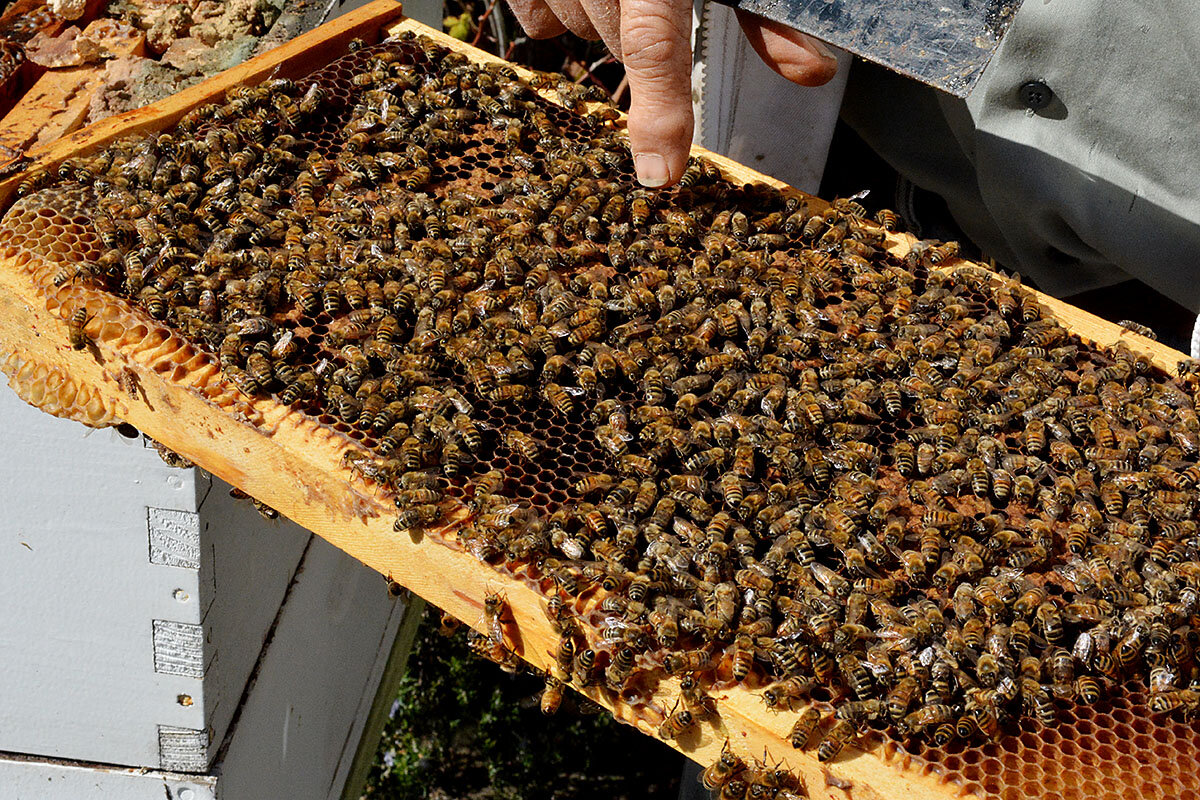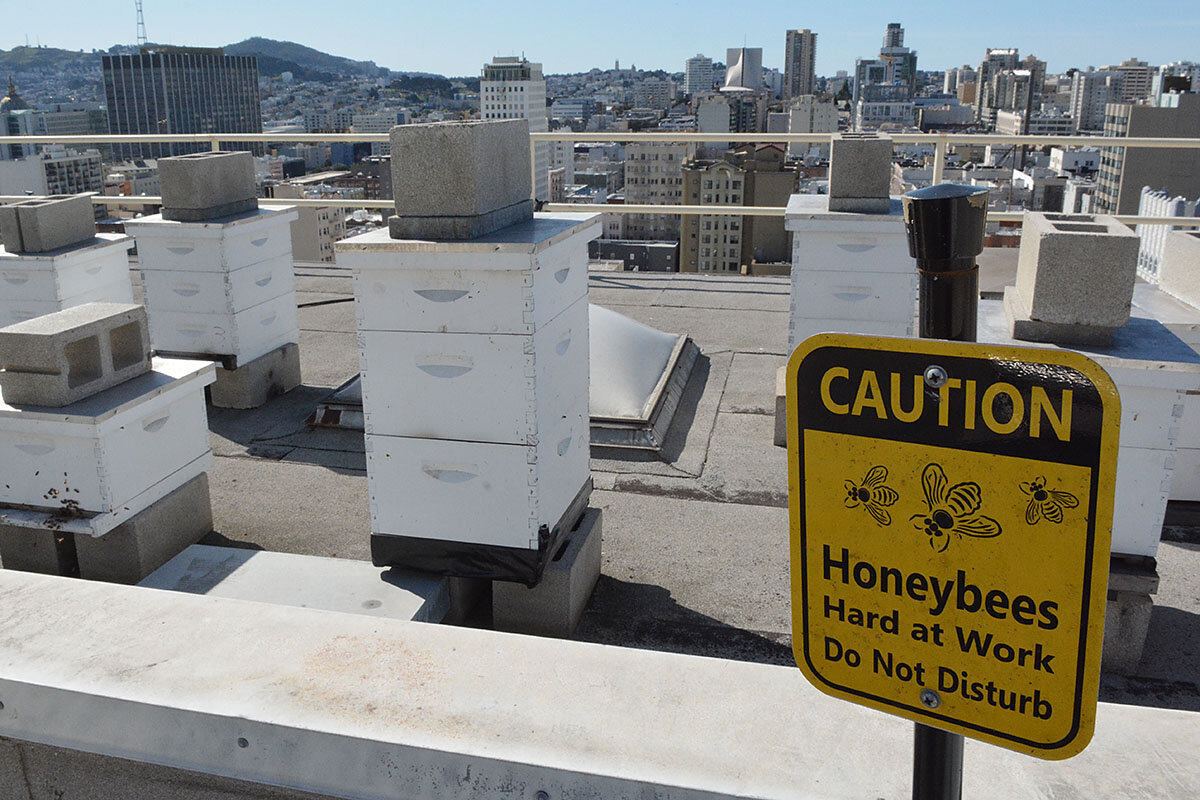In San Francisco, hotels welcome bees as honored guests
Loading...
| San Francisco
At the Fairmont San Francisco, the well-heeled visitors arriving through the front door aren’t the only guests staying at the five-star hotel. On the hotel’s rooftop terrace, above the rush and bustle of San Francisco’s city streets, a fainter hum can be heard – the buzz of bees.
Beekeeper Spencer Marshall pries open a white, wooden box that houses thousands of bees and pulls out a frame that vibrates with life. The makeshift hive sits nestled among garden boxes overflowing with lavender and rosemary, a delicate contrast to the jagged skyscrapers that loom in the distance.
Bees have become more commonplace residents at hotels, especially in San Francisco where ten hotels maintain hives on terraces and rooftops. Urban beekeeping allows hotels to market sustainability, harvest honey, and raise awareness for the particular challenges bees face. Rooftop apiaries have been popping up across the country in the past decade, from San Francisco to Chicago to New York.
“When companies have honeybees, it helps in a few different ways ... by bringing awareness to the fact that our bees need flowers that are clean and free of pesticides in order to feed and that our bees need habitat,” says Becky Masterman, extension educator and program director of the University of Minnesota Bee Squad in St. Paul.
Urban beekeeping has been on the rise for the past decade, says Dr. Masterman. “The popularity has been growing ever since the news started reporting high numbers of bee losses in 2006,” she says. That year, honeybee losses increased dramatically, up to 30 to 90 percent of each hive, due to the presence of mites, destructive pesticides, declining habitat, and a mysterious phenomenon known as colony collapse disorder, where worker bees fled hives in devastating numbers.
Bees are an essential element of agricultural economies, especially in California, which produces one-third of the vegetables in the United States and two-thirds of its fruits and nuts, according to the California Department of Food and Agriculture.
Wild bee species play a significant role in this process but the US agricultural industry has come to rely on commercial bees for much of its pollination needs. At pollination time, commercial beekeepers provide truckloads of European honeybees, Apis mellifera, which are not native to North America. Persistent losses of these commercial hives could eventually be felt at the grocery store.
“The costs of our fabulous fruits and vegetables that the bees pollinate could potentially go up over time because the pollination costs are higher,” says Masterman.
Mr. Marshall has served as the Fairmont’s bee whisperer since 2010. Initially doubtful that the urban location would offer enough resources to sustain the bees, he says he has been pleasantly surprised with the results. Each year, he harvests 1,000 pounds of honey at the Fairmont, which currently hosts nine hives and up to half a million bees. “It was an experiment and the experiment was a total success. These bees do incredible,” says Marshall.
For the hotels, the bees offer more than honey. More guests are looking for places to stay that are committed to sustainability and locally sourced food, says Melissa Farrar, director of marketing communications for the Fairmont. The hotel chain plays host to 40 honeybee apiaries and wild bee hotels around the world. At the Fairmont San Francisco, harvested honey adds flavor to salad dressings, ice cream, and honey madeleines at the hotel.
Just down the hill from the Fairmont is the Clift hotel, which introduced bees to its 16-story-high roof in 2016. The Clift, which hosts three hives on its rooftop, features honey with cheese and charcuterie board appetizers, denoted by a small depiction of a bee next to each item on the menu.
Beekeeping also gives hotels the opportunity to work together. Michael Pace, area general manager at the Clift, has since helped bring beekeeping to other hotels through the Hotel Council of San Francisco’s sustainability committee. Currently, nine participating hotels share resources, best practices, and a beekeeper. “On the street level, all the hotels are competing with each other, ... but then on the rooftop,” says Mr. Pace, “we’re all sharing resources ... and we help each other out.”
Both the Fairmont and the Clift offer tours of hive spaces to interested guests, some of whom start their own hives. The Fairmont has also hosted school groups from preschoolers to high school photography classes. “[G]iving back what we’ve taken away is really the goal. [At] hotels – you have so many people coming and going – it’s a great platform to educate guests,” says Ms. Farrar.
For Pace, the beekeeping is part of a larger trend toward more sustainable, environmentally aware travel. “Maybe we can just do one little thing as hoteliers to ... help people appreciate that nature’s important, that we take care of the environment. And if you want to eat fruits and veggies ... you need bees in the background.”








